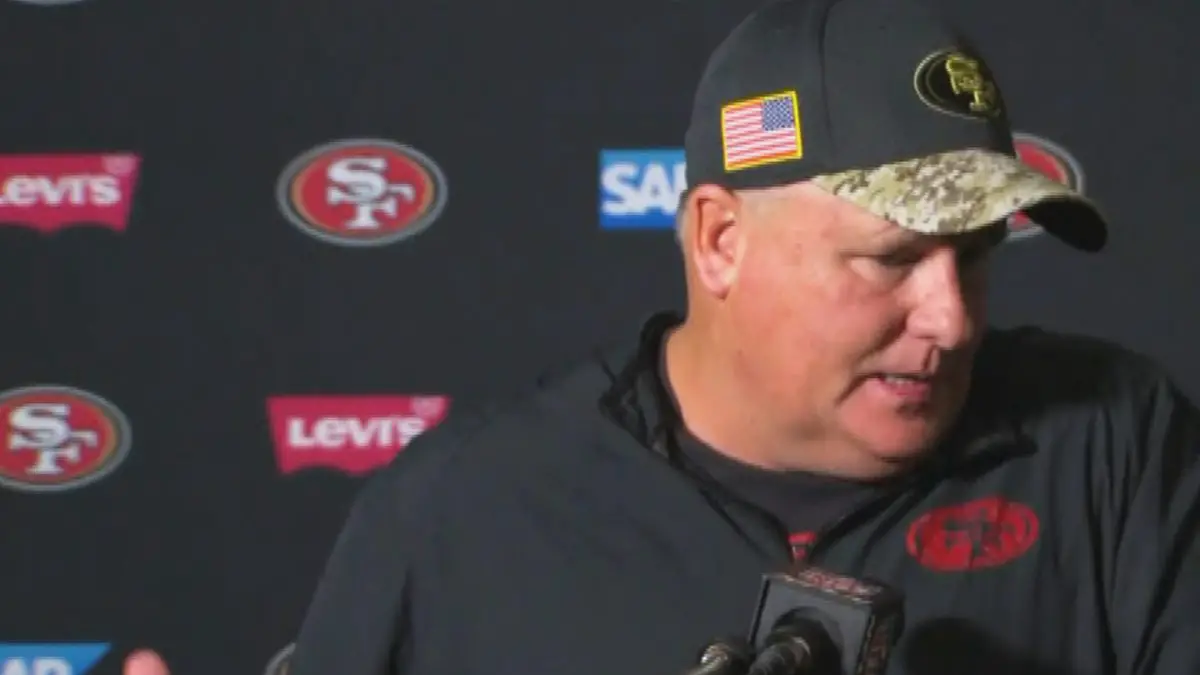At one time or another we all slogged through basic literature and were tutored in the Greek structure for the dramatic story, that of Beginning, Middle and End. So if Oregon (my alma mater) was the beginning, and San Francisco (my home) the end, then I feel as though I’ve had a front row seat to the story arc of Chip Kelly.
From the hottest name in coaching – a visionary of how the sport would be played – to a two-time loser and out of the game, all in the span of four years.
That’s an amazing fall from grace, and a story that has all the earmarks of a tragedy, no redemptive ending in sight. But wait, what if Alabama or Bill Belichick ride to the rescue and pull Kelly from the flaming wreckage of his coaching career, and … whoa, whoa, you say, back up a minute – Belichick a hero?
I know I’m getting way ahead of myself, so let’s start from the beginning.
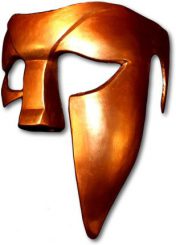
The mask of impending tragedy.
Photo Credit: Aithyia
What was the worst decision you ever made? Bought that house in a flood zone? Sold Apple before the split? Scarfed down that street taco in Ensenada? For Chip Kelly, his decision to leave Oregon in 2013 has to sit pretty high on any “worst of” lists. Because, Willie Lyles aside, throughout his Oregon tenure Kelly could do no wrong. From his blitzkrieg offense, to unique conditioning and team building with the Navy Seals, to his designer smoothies and training table innovations, Kelly’s infrastructure and systems were flawless.
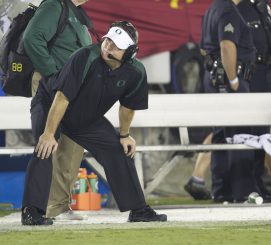
Coach Kelly on the sideline at USC 2012.
Photo credit: Kevin Cline
His on-the-field successes were even better – his teams at Oregon didn’t just win, they dominated. Against some of the brightest minds in defensive football, wrap your head around these offensive stats: 613 yards/47 points against Pete Carrol’s Trojans, 713 yards/62 points against Monte Kiffin’s Sun Devils, 626 yards/52 points against Vic Fangio’s Cardinal.
The Kelly spread – with it’s foundational concepts of speed, precision, execution and teamwork – was the future of college football, and he pushed Oregon to unprecedented heights and an .868 winning percentage (46-7). It was one hell of an opening act.
But there is an old saying, “When the gods want to punish you, they give you what you want.”… And for whatever reason, by the end of the 2012 college football season, Kelly wanted out. Many have speculated as to the reasons why – the recruiting grind, the NCAA probe, the desire for new challenges; but in the end, no one but Chip could definitively answer that question. And though many have tried most will admit that it is virtually impossible to get inside the head of one Charles Edward Kelly.
Son of a lawyer, guarded New Englander to the core, Kelly was, and still is, intensely protective of his personal life. For instance, did you know that it took Chip the better part of 10 years to get his undergraduate degree from the University of New Hampshire? Or that he was married for seven years back in the 1990’s? None of us did, and that’s fine. But given his personality, it makes it very difficult to fully understand why a man would leave paradise for the great unknown.
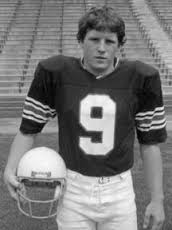
The aspiring Chip Kelly.
Photo Credit: Cover32
Those who purportedly “know” him say that Kelly’s end game was always to coach in the pro’s, and that despite all the accolades and successes, Eugene could only be a way station for him.
It was reported that Kelly was signed for the Tampa Bay job in 2012 before a last minute change of heart kept him in Eugene for one more season. I like to think perhaps, despite his lifelong ambition to coach at the highest levels of the sport, that he was truly conflicted. That Eugene and all its quirky charms had a surprisingly strong hold on his heart. And even when the brass ring came around a second time, this time from Philly, he was still struggling between head and heart, between ambition and satisfaction. This time, despite another round of introspection and struggle, ambition won the day. It was “Hello, Philadelphia.”
The honeymoon lasted for two years. It was in Year 3 that the path was lost, that Chip’s ambition – this time unchecked after two straight 10-win seasons – reared it’s ugly head yet again. The dual role of head coach and GM, what Kelly essentially assumed after winning a power struggle in early 2015, is a herculean task that no one (to date) has been able to master. Chip was no exception. He failed spectacularly behind an offense, stacked with hand-picked players, which stagnated to 26th in league efficiency, an overworked defense and a fractured locker room.
What happened? Chris Brown of The Ringer wrote an excellent article in 2016 that posed many interesting theories. Of how Kelly quickly realized that having a true “dual threat” quarterback at the NFL level was a virtual impossibility – game speed and injury being the primary factors. Forced to phase out elements of the read option, Kelly scaled down his offense to the point where opposing defenses began to recognize trends.
Some would go so far as to say that Philly was tipping plays. In brief, the alignment of the tight end and running back would give the play away. If Kelly lined the tight end and running back on opposite sides of the ball, the Eagles would run a sweep towards the tight end. If the tight end and running back lined up on the same side of the ball, the play was typically an inside zone to the opposite side. In an early 2015 loss against Dallas, the Eagles totaled 7 yards rushing, and ex-Duck Josh Huff (playing receiver) said that the Cowboys were calling out Philly’s plays before the snap. Ouch!
And while speed remained at the forefront of his system it wasn’t the warp speed of Oregon’s spread. The Ducks ran an average of around 85 plays per game. The Eagles around 65 plays, and that differential was largely due to NFL officials and the process they use to spot the ball.
Bottom line: In the NFL, officials control the pace of the game, not coaches.
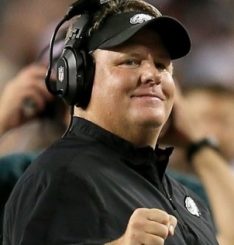
Chip Kelly feeling the pain in Philadelphia.
Photo Credit: Smart Football
Possibly even more disturbing were the trends developing on the defensive side of the ball. Stop Kelly’s tempo and you stop his team, and this was never more evident than during his last two seasons in the pro’s.
In 2015, a stagnating offense forced the Eagles to defend 1,148 plays, almost 200 more than Seattle’s top-ranked defense. That’s the equivalent of a Kelly defense playing almost three additional games. By the end of the 2015 season the Eagles defense was in tatters, injuries having taken a severe toll, a script that played out almost identically with the Forty Niners’ defense during the 2016 season.
This points to yet another significant difference between college and professional football. In college you can dress upwards of 90 players for each game, the NFL allows you to dress 46. Rolling multiple defensive fronts and mass substitutions were a thing of the past for Kelly, and attrition became the undesired hallmark of a Chip Kelly defense.
But what’s puzzling me after watching the Niners implode this year was how little Kelly’s philosophy changed between his tenure with Philadelphia and San Francisco. Brown used the term “innovator’s curse,” – that once having innovated, it’s hard for anyone to continue to innovate and remain cutting edge.
Granted, the Niners experiment was doomed from start. The roster, the ownership and the GM were all operating on different agendas. I can only think that Chip’s burning desire to coach again trumped his intellect and that he ignored all of the disaster signs to take the Niners’ job. But given all that, where was the ability to adapt, to make necessary changes to his system in order to grow and thrive?
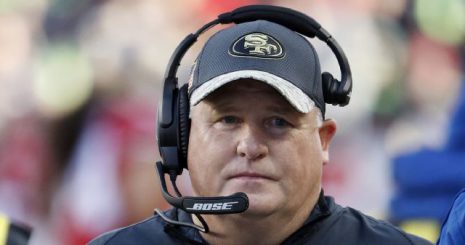
Chip Kelly with the San Francisco ’49ers.
Photo Credit: Notey
Thankfully it appears as if the coaching carousel has passed him by this year, effectively saving Chip from himself. And if you remain a fan of Chip Kelly, as I do, then that’s a good thing. He needs a year to process … latest rumor as a television analyst for FOX.
My crystal ball says he won’t be given another HC job in the NFL. He carries too much baggage and represents too big of a financial risk for an enterprise as massive as an NFL team to take on.
And more to the point, name me a fan base (aside from possibly Tennessee) that would want him? An offensive coordinator position might have some merit, but you’d need an awfully strong head coach (hello Belichick), to keep that massive Kelly ego in check, and you’d still have the same problem of an overtaxed defense playing opposite a Kelly offense.
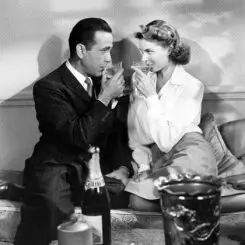
Ah, Paris …
Photo Credit: Screener
As wonderful a pipe dream as coming back to Oregon was (post Helfrich), it was never going to happen. Thomas Wolfe famously wrote, “You can never go home again,” and Kelly was wise enough to realize that.
But college is where Kelly belongs, and where I believe he’ll once again thrive. College Football provides his best path to coaching redemption – quite possibly his only path.
He’s a smart guy and I think he’ll come to that realization after a year or two in the booth. The flame to coach hasn’t been extinguished, only diminished, and if neither Chip nor the Ducks ever rise again to the heights achieved during his tenure at Oregon, so be it. As Bogart said to Bergman in Casablanca, “We’ll always have Paris.”
Top photo credit: CSN Bay Area
Marc Burton
San Francisco, CA
These are articles where the writer left and for some reason did not want his/her name on it any longer or went sideways of our rules–so we assigned it to “staff.” We are grateful to all the writers who contributed to the site through these articles.

